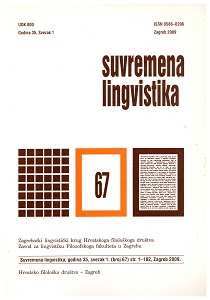Rječotvorni modeli u hrvatskom jeziku
Word–formation Models in Croatian
Author(s): Petra Košutar, Branka TafraSubject(s): Language and Literature Studies
Published by: Hrvatsko filološko društvo
Keywords: word–formation; the emergence of words; Croatian language
Summary/Abstract: In Croatian grammar, as well as in grammars of other languages, mainly two major types of word–formation models are distinguished: derivation and compounding, and other word–formation models are mentioned only marginally. In that way the formation of numerous words remains unexplained. This paper discusses the question: How a word is formed? Since words can be formed through grammatical processes (e. g. grad–ski, pri–gradski, donj–o–grad–ski), and through semantic processes (e. g. lexicalization, /de/onymization, homonymization etc.), our point of departure is that word–formation should describe all possible ways of word–formation from affixation, language borrowing, loan translations, shortening, to depolysemization and lexicalization. Consequently, word–formation is regarded in this paper as an independent linguistic discipline and its range is extended in reference to earlier approaches within the grammars of the Croatian language. By applying different criteria of classification, differentiation of several more word–formation types and subtypes has become possible. Through critical reviewing of word–formation studies in Croatian, suggestions on possible solutions to some contentious issues have been suggested.
Journal: Suvremena lingvistika
- Issue Year: 35/2009
- Issue No: 67
- Page Range: 87-107
- Page Count: 21
- Language: Croatian

